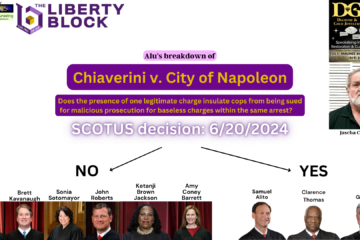Editor’s Note: This piece was originally drafted in the aftermath of the Highland Church shooting in 2019. We have decided to publish the piece now due to its uncommon approach in defense of the Second Amendment.
With every new convenient-to-narrative bit of news about a “mass shooting” comes the inevitable demand for more gun control – usually from the left, sometimes from the right – and thus ensues the inevitable debate about what “arms” you should be allowed to “keep and bear”. Even many Libertarians, and the staunchest of gun-rights advocates – including the likes of Ben Shapiro – have some line they draw in the sand when a leftist makes the nuke argument: “You wouldn’t allow someone to own a nuke, right?” It’s a trap of a question, because the minute you draw a proverbial “line in the sand”, you’ve lost the argument, and the left will insist you have to agree with them on their extreme policies on the control of the free market, and, in turn, your “right to choose”. Here’s the thing: They’re right.
The appropriate response is “Yes, you can have a nuke.” And here’s how you make that argument:
The first question to ask is, “If an AR-15 naturally cost you $1 billion, how many people would own an AR-15?” The word “naturally” is important, because it means that the price is set, in this case, by the market, and not some coercive source.
The answer, obviously, is no one; there are still only a tiny number of billionaires in the US (705, as of May 9th, 2019), and what constitutes a “billionaire” is someone whose whole net worth is at least $1 billion, which means they’d have to fully liquidate every asset they own (including the clothes on their backs) for one AR-15; all assuming, of course, they pay nothing in liquidation costs. More importantly, this also all assumes, of course, that the people who are the best in the world at making money, and who devoted an enormous amount of their lives to making money, are suddenly going to stop making money, and trade in all of the wealth they’ve often worked all of their lives to amass for one AR-15. I find it hard to believe those people are that financially illiterate.
So let’s, then, imagine a world where a fully-realized, deliverable, practically functional fissile or thermo-nuclear device is 100% legal for an individual to “keep” (we’ll work on the “bear” in a moment), but where no other law or regulation of any kind related to getting to that point is revoked; all other laws remain unchanged.
The first thing someone would need is the technical capacity. As of July, 2019, all of 21 countries have ever had deliverable nuclear arms, had a program to develop them, or have ever been considered “States of Immediate Proliferation Concern” for developing a weapon, and one of the countries that has yet to get its hands on a nuclear device is Iran, who has spent – for all intents and purposes – the past nearly seven decades trying to get their hands on a “nuke” to no avail. For comparison, the US – inventors of the technology – spent almost $2 billion in 1945 dollars on the Manhattan Project to put all of 3 nukes in our hands, after which it was years before we had any more. As such, we can assume there are no more than 21 governments who even possess the technology to develop them, and it’s important to note that the technology is only in the hands of governments. The short version is that the technology is not for sale, and probably rightly so.
That means you will have to come up with the technology from scratch yourself, knowing that certain countries have spent nearly 7 decades trying to do just that unsuccessfully, and knowing, too, that it took the United States swallowing virtually all of the best minds the world had to offer – and by the score, at least – six years and $1.89 billion (or ~$21.3 billion in 2018 dollars), and basically assuming by decree all of the enriched uranium and plutonium the world had to offer outside of Nazi Germany and the Soviet Union…for three bombs.
Although the underlying physics behind a “chain reaction” might be something as accessible as any article on Wikipedia, properly understanding Wikipedia’s needlessly technical article on so much as “nuclear fission” would require a special expertise in the field not easily achieved without spending three-quarters-of-a-decade in a university actually learning the underlying subject matter attentively.
The short version is simple: just developing the technology is really, really hard. You won’t be able to do it by yourself, period, and it will cost you and a bunch of your billionaire buddies everything you have accumulated and many years to get even so much as the technology for a nuke in your hands, all assuming you can even find a place to test the products of your research and development, working or not.
Of course, even developing the technology will require getting your hands on an insane amount of fissile material, even for a thermonuclear device, because all of those weapons require a fissile reaction to activate the fusion reaction in the first place.
There is a legitimate argument for the regulation of ultra-radioactive material, which is that a block of super-radioactive, say, polonium sitting on your kitchen counter is so radioactive[1][2] its mere existence introduces parties to that transaction (the decision to let it just sit on your countertop) without their consent. In short, the radioactive particles certainly will penetrate our shared wall, and almost certainly will kill them and their pets, all with no possible way of knowing: radioactive particles are odorless, silent, invisible, tasteless particles that travel right through walls, and to require everyone to have a Geiger counter in every room is a ridiculous ask. To return the transaction to one that is entirely consensual, obviously government has a legitimate role in regulating how you store, transport, use, and buy/sell highly radioactive material so long as that regulation pertains specifically to this concern. A loaded gun sitting on the countertop, by contrast, does not become dangerous until you act upon it. The opposite is true of the block of polonium: it is inherently dangerous until you act upon it. Note that a block of polonium is also obviously not an “arm”.
This means that to get the weapons-grade enriched product, you’ll have to jump through giant hoops that the government doesn’t have to because, well, it’s the government and you’re not. And then you’d have to find an enrichment facility willing to enrich uranium/plutonium to weapons grade, which no facility in the private sector in the US is doing for obvious market reasons and, almost surely, for legal reasons. In short, you’re developing your own, in-house enrichment plant in addition to a mining company, and that’s before we have the talk about making a delivery device.
Today, the least expensive nuclear arms in the US government’s possession will cost $20 million each (as of 2017) just to refurbish, and the capital costs have already been depreciated; more expensive devices will run into the hundreds of billions of dollars once the cost to develop a plane that can deliver the missile is factored in.
So, where does that leave us?
If the mere ownership alone of a nuclear device were allowed in the private sector, you’re talking about spending tens if not hundreds of billions of dollars (the $2 billion spent on the Manhattan Project alone equates to over $28 billion today) just to get the technology, and it’s going to mean amassing all of the world’s greatest minds and jumping through hoops the folks working on the Manhattan Project didn’t have to. Just to get one nuke.
Which means what we’re talking about is a bunch of the richest people in the world spending every penny they earn not doing the thing they’ve spent their whole lives doing to instead spend it on getting one nuke. And then what are they going to do with it? Are we really to believe the best businessmen in the world are going to actually use that device on what would presumably be their own customers? That the best businessmen in the world are going to detonate a device they just spent all of their earnings on without meeting a very high standard of desperation? How naïve are we going to pretend we are?
Perhaps some nefarious arms dealer could get a group of dictators to conglomerate their resources to get their hands on one? Would we allow them to bring it into our shores? Of course not. One of the few legitimate actions of the federal government is ensuring the security of our borders, so, obviously, allowing Osama Bin Laden to cross our borders with a proverbial “Fat Man” would be a dereliction of one of the federal government’s only legitimate duties. What about in their own borders? Sovereignty requires, well, sovereignty, and they’re already trying to do this, so what exactly would change?
In a word, nothing. It is preposterously unlikely that any private sector actor with any hope of succeeding would even pursue obtaining a fully-realized, deliverable nuclear device, and that’s not even factoring whether or not they would actually be successful, and, if they did, that they would unreasonably use the device seems wholly antithetical to everything we know about these types of people in the first place. And, for the record, yes, leaving the nuke “outside” with a proverbial “red button” in plain sight would create an “attractive nuisance”, so local regulation thereon may well be justified as it relates to storage and activation method. If what we’re talking about is a ten-story ICBM with a nuclear warhead, obviously local ordinances may be necessary to ensure proper storage, however, neither of these two areas of regulation necessarily forbid mere ownership in private hands, nor do they necessarily limit the mere tenets of ownership.
Which, of course, is what we’re talking about: mere ownership. And, to that effect: no, Ted Kaczynski is not getting his hands on a nuke; Khalid Sheikh Mohammed is not getting his hands on a nuke; and Antifa[3][4][5] are not getting their hands on a nuke. Not legally, anyway, but isn’t that the point?
It is. Yes, you can have a nuke.


